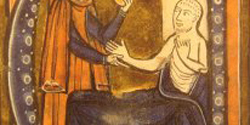Eboo Patel told of how his son was delivered under the watch of a Jewish obstetrician and a Catholic nurse, and has been cared for by a Colombian Catholic nanny.
It’s a true “welcome to the world,” experience, Patel told a group of educators and religious leaders at a forum earlier in April at Louisville Presbyterian Theological Seminary.
“I no longer live in a world where I have either the luxury or the possibility of raising my son in a Muslim bubble for 15 years and then sending him out into the world,” Patel said. He was visiting to deliver the annual lecture for the Louisville Grawemeyer Award in Religion, which he received for his work in founding the Interfaith Youth Core, an international organization that fosters cooperation among young people of different religions.
That multi-religious world now permeates the United States, said Patel, who grew up in suburban Chicago. In his Grawemeyer-winning book, “Acts of Faith,” he told of his upbringing in a Muslim Indian immigrant family in suburban Chicago, and of how he grew to appreciate Islam only amid his positive encounters with the Buddhist Dalai Lama and the Catholic Worker movement.
So Patel spoke from experience when he applauded a new effort by the seminary — to explore ways to train future pastors more explicitly in the challenges of ministry in that multi-religious context.
The seminary plans to launch a program called Doors to Dialogue (or D2D), that tries to answer those challenges. Details are still being worked out, but the goal is to weave the subject throughout the seminary curriculum. “Places of ministry for our students are now found in a world where religious diversity is as close as the next-door neighbor, no matter how small the church and no matter how remote the community may be,” said seminary Dean David Hester.
Patel said those challenges are everywhere — in hospitals, where Catholic sacraments and Buddhist chants may be taking place in nearby rooms, and in pulpits, where pastors know “the children of that church go to school with kids from other religions.”
It has to change preaching, because the questions in the back of a 10-year-old child’s head are simply different,” he said.
Patel emphasized that clergy-in-training should not water down their teachings but rather do the opposite — define and express them more clearly.
Appreciation of “the cool things about the other religions” should be “secondary,” Patel said. The primary thing: “Make our stuff cool.”
“My grandmother was very good about this,” he said. “I was very excited to tell her about the Metallica concert I was going to in eighth grade. She listened to me about the joys and sweats of mosh pits. Then she’s like, ‘Do you know about the whirling dervishes (practitioners of mystical dancing) in Islam?’ She knew what I thought was cool.”
He gave the example of a Presbyterian kid in seventh grade: "Your Hindu friend has all these colorful festivals, and your Buddhist friend has all of these crazy mandalas (spiritual art) in his home, and your Muslim friend has this commitment around fasting, and you’re like, ‘Isn’t that cool?’"
Patel said parents need to find a better response than, "Yeah that’s cool, but we’ve got to go do this church thing at 8 a.m. on Sunday."
He suggested saying: "Yes there is a beautiful world of people from different religions, and here is why your family has been Presbyterian for four centuries."
One of the things he admires most about evangelical Christians, he said, is “they are proud of what they believe and they are very good at making it cool for 13-year-olds.”
One person at the session asked if promoting programs of interfaith dialogue amounted to “preaching to the choir” — involving only the more tolerant strands of Christianity and other religions, rather than evangelical Christians and conservatives in other religions who are firm in believing God has revealed only one way to salvation.
“I actually think preaching to the choir is a really good thing,” Patel responded. “If the choir is American mainline Protestantism, that’s something on the order of several tens of millions of people, a pretty good-sized choir.”
He added: “When the choir knows the song and sings the song, it makes a big difference. It has learned the song around race relations, it has sung that song. It is learning the song around sustainability, and is singing that song.”
Patel also said he deeply admires evangelical Christians, saying they have worked out practical problems of interfaith cooperation. He said others can learn from evangelical relief organizations, which often hire locals from other religions in Asia and Africa and cooperate with leaders of other faiths.
“You don’t go to those places frequently if all you’re doing is talking Jesus and handing out Bibles,” he said.
Peter Smith is the religion writer for The Courier-Journal. This column is adapted from his Faith & Works blog at www.courier-journal.com/faithblog. He can be reached at (502) 582-4469.
 Sri lanka Muslims Web Portal Diversity and Inclusiveness
Sri lanka Muslims Web Portal Diversity and Inclusiveness



